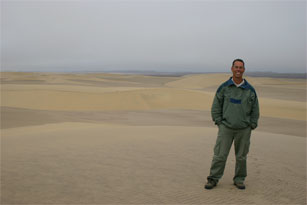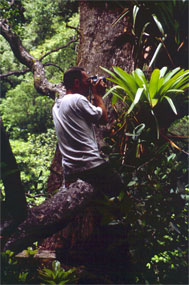George Amato
Director, AMNH Sackler Institute for Comparative Genomics
Ph.D. in Biology, Yale University, 1994

George Amato is Director of the Center for Conservation Genetics at the American Museum of Natural History. This program links efforts in the Museum’s Center for Biodiversity and Conservation (CBC), Sackler Institute for Comparative Genomics (SICG), and Ambrose Monell Cryo-Collection for Molecular and Microbial Research (AMCC) in efforts to conduct research and training in this expanding area of biological conservation. Current conservation genetics research areas include systematics and units of conservation, population level issues due to fragmentation of habitats and over-harvesting of wildlife, molecular ecology, and wildlife forensics. There are also formal graduate student training and informal education programs.
Dr. Amato received his B.S from the University of Connecticut and Ph.D. in Biology from Yale University. In 1989 he began research in conservation genetics at the Wildlife Conservation Society (formerly the New York Zoological Society) based at the Bronx Zoo. In addition to creating and directing the WCS Conservation Genetics Program, he was also the Director of the WCS Science Resource Center and was Director of Conservation and Science for the WCS Living Institutions until 2005. Dr. Amato is also an adjunct associate professor at Columbia and Fordham universities and a research associate in the Ecology and Evolutionary Biology Department of Yale University.

His current research interests include genetic issues associated with fragmentation in endangered parrots and crocodilians, taxonomic and phylogenetic questions related to the discovery of new species of mammals in Southeast Asia and Crocodiles in Africa, non-invasive sampling techniques for endangered species, and monitoring the trade in endangered species products using DNA based forensic science. Dr. Amato has participated in research activities worldwide, including research in Cuba, St. Vincent and the Grenadines, Madagascar, South Africa, Tanzania, Malaysia, China, and Peru. He has published and lectured extensively on conservation strategies for endangered species and especially on using molecular analyses to determine conservation priorities.
Most recent publications
- Amato G, Ryder O, Rosenbaum HC, DeSalle R [Editors]. in press. Conservation Genetics in the Age of Genomics. Columbia University Press, NY.
- Li Y, Wu XB, Yan P, Amato G. 2007. The complete mitochondrial genome of the salt-water crocodile (Crocodylus porosus) and phylogeny of crocodiles. Journal of Genetics and Genomicsin press
- Kretzman M, Mentzer L, DiGiovanni R, Leslie MS, Amato G. 2006. Microsatellite diversity and fitness in stranded juvenile harp seals (Phoca groenlandica). Journal of Heredity 97(6), 555-560.
- Ji XF, Wu XB, Li Y, Yan P, Amato G. 2006. The mitochondrial genome of Crocodylus niloticus with implications for phylogenetic relationships among crocodilians. Acta Zoologica Sinica 52(4), 810-818.
- Lin K, Russello MA, Caccone A, and Amato G. 2005. Additional microsatellite loci for the endangered St. Vincent parrot, Amazona guildingii. Conservation Genetics 6, 643-645.
- Goldstein P, Wyner Y, Doukakis P, Egan MG, Amato G, Rosenbaum HC, and DeSalle R. 2005. Theory and methods for diagnosing species and populations in conservation. Annals of the Missouri Botanical Garden 92, 12-27.
- DeSalle R and Amato G. 2004. The expansion of conservation genetics. Nature Reviews Genetics 5, 702-712.
- Russello MA and Amato G. 2004. Ex situ population management in the absence of pedigree information. Molecular Ecology 13, 2829-2840.
- Palcovacs EP, Oppenheimer A, Gladyshev E, Toepfer JE, Amato G, and Caccone A. 2004. Genetic evaluation of a proposed reintroduction: The case study of the greater prairie chicken and the extinct heath hen. Molecular Ecology 13, 1759-1769.
- Milinkovitch MC, Caccone A, and Amato G. 2004. Molecular phylogenetic analyses indicate extensive morphological convergence between the “yeti” and primates. Molecular Phylogenetics and Evolution 31, 1-3.
- Russello MA and Amato G. 2004. A molecular phylogeney of Amazona: implications for Neotropical parrot biogeography, taxonomy and conservation. Molecular Phylogenetics and Evolution 30, 421-437.